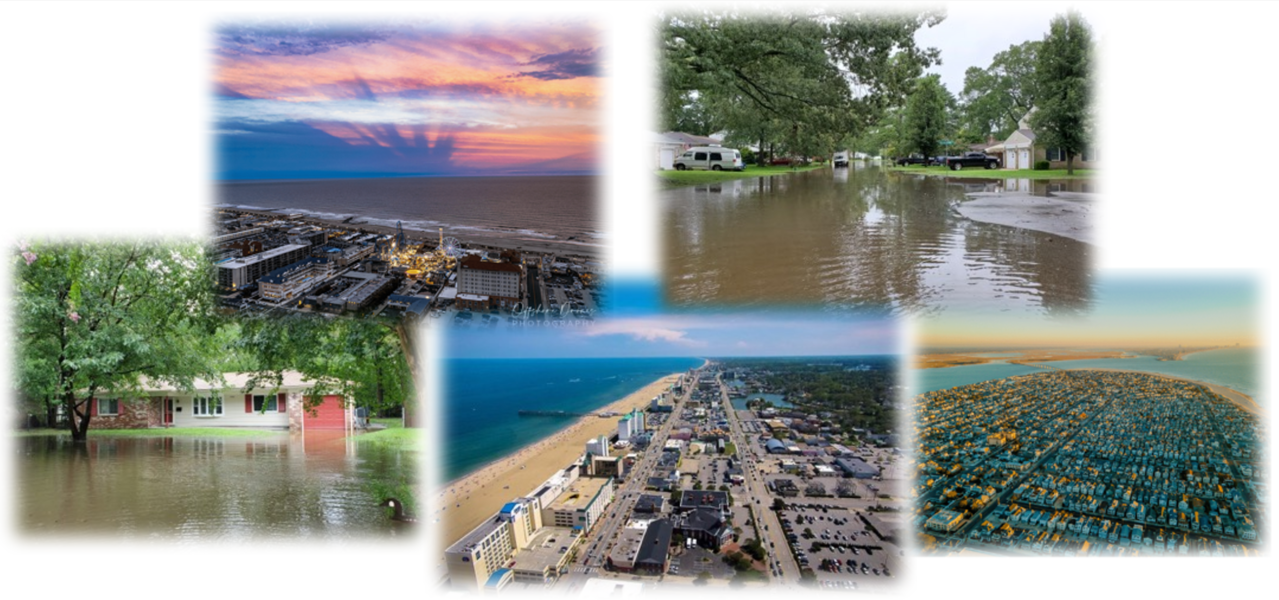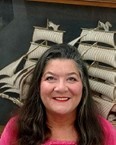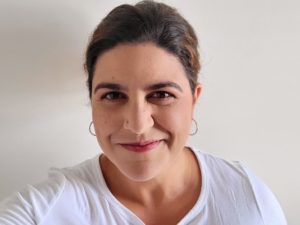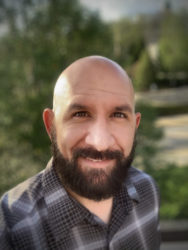Apply now to join our next cohort of Community Science Fellows and Community Leads!

Images courtesy of Virginia Wasserberg, Suzanne Hornick, and Offshore Drones
Large Scale wind farms are being proposed off the coasts of two participating communities – Ocean City, New Jersey and Virginia Beach, Virginia. In Ocean City, the proposed largest wind farm in the country would be powered by potentially as many as 600 turbines anchored 10.4 miles off the coast. In Virginia, plans are underway to build nearly 200 giant wind turbines 27 miles off the shoreline. Both communities suffer from coastal flooding and tourism impacts from climate change and support solutions to mitigate these challenges, but are concerned about being futuristic and cautious before embracing alternative energy sources by taking into consideration all potential outcomes, both positive and negative, with regard to environmental, marine, tourism, and socioeconomic impacts. In this project, we will explore the pros and cons of offshore windfarms against other potential alternative renewable energy sources in the face of a changing climate and exacerbated flooding.
Ocean City, New Jersey is in Cape May County and is an 8-mile long barrier island of 11,701. During the summer months, the population can include over 1 million visitors. Ocean City faces the biggest hit to its property values from sea level rise on the eastern seaboard, surpassing even Miami Beach. The city has the greatest number of newly constructed homes in those risk zones in the entire United States. Virginia Beach is a city of 437,994 and is the most populated city in the state of Virginia. The city has been impacted by multiple flooding events in recent years. The low-lying land is sinking and, combined with sea level rise, southeastern Virginia is experiencing one of the fastest rates of sea level inundation on the East Coast. Both communities already have strong support groups focused on flood mitigation and growing interest in understanding offshore wind energy development to ensure their communities remain protected and best served moving into the future.
The two partner communities want informed stakeholders to be able to engage in conversations and planning toward balancing their needs with the best alternative energy solution. Our project aims to develop community knowledge and input capacity by working with experts to help inform about the development of offshore windfarms and potential alternative energy sources. We will engage with community stakeholders to empower them through education about the benefits and impacts of offshore wind development with particular focus on climate change and coastal flooding impacts. We plan to conduct an Impacts Assessment from both the community and scientific perspectives to improve transparency regarding these values and potential concerns as part of the offshore wind development conversation.
This project is expected to take 12-18 months to complete.

Ocean City, NJ Project Leader- Suzanne Hornick
Suzanne Hornick is the founder and chair of the Ocean City Flooding Committee in Ocean City, NJ. Suzanne’s family has owned the property they currently reside in since the early 1940s. She is dedicated to raising awareness of flooding and climate impacts across the barrier island with residents, vacationers, and local city government to inspire these groups to reduce flooding and restore parts of the island for future generations.

Virginia Beach, VA Project Leader- Virginia Wasserberg
Virginia Wasserberg is a member of the Princess Anne Plaza Civic League Flood Committee and the Leader of Stop the Flooding NOW in Virginia Beach, VA. Virginia is a music major and homeschooling mother of two. In October of 2016 she and her husband, experienced a combined 18 inches of stormwater and sewage back-up due to heavy rains from two tropical storms and Hurricane Matthew. Virginia’s entire neighborhood was flooded and many homes were severely damaged. It took 3 months of restoration before Virginia and her family could move back into their Virginia Beach home. Shortly after these events, Virginia became involved with her local Civic League, seeking solutions to the persistent flooding. After meeting with Virginia Beach City staff, Virginia was motivated to create a Facebook community page, Stop the Flooding NOW in an effort to connect residents with flooding on a more personal level. The page gained momentum in the following months and is an important communication resource for many residents of Virginia Beach.

Dr. Jason Polk is a Professor of Environmental Geoscience at Western Kentucky University. He serves as Director of the Center for Human GeoEnvironmental Studies (CHNGES) and HydroAnalytical Lab. Dr. Polk earned his doctorate degree from the University of South Florida in Geography and Environmental Science and Policy and his current research investigates groundwater resources, isotope hydrology and geochemistry, karst resource management, and global climate dynamics. Dr. Polk is passionate about the integration of human-environmental research and community development through applied research. He has technical expertise in hydrologic monitoring, water quality and quantity assessments, groundwater resource management, and solution-based approaches to resilience and adaption planning for communities. Dr. Polk conducts research throughout the world, including the Caribbean, Vietnam, Iceland, and Europe and has worked in the longest, largest, and deepest caves in the world.
We seek three scientific experts with complementary expertise to tackle this diverse and interdisciplinary project, with focal areas in Marine Resources, Environmental Science and Policy, and Environmental Justice and Education. Scientific experts should contribute to the following project goals:
Specific skills and qualifications desired from each expert are as follows:
Marine Resource Scientist
Environmental Scientist
Social Scientist/Anthropologist
All scientific experts should possess the following skills:
Thriving Earth Exchange asks all scientific partners to work with the community to help define a project with concrete local impact to which they can contribute as pro-bono volunteers and collaborators. This work can also position the scientists and communities to seek additional funding, together, for the next stage.
(c) 2024 Thriving Earth Exchange